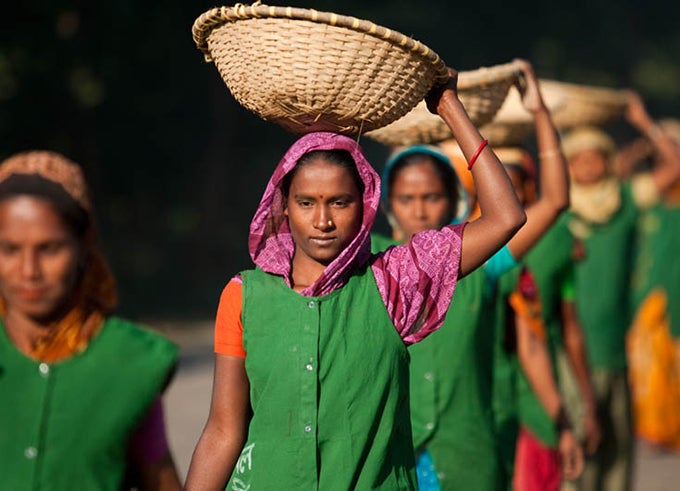
Not long after her husband suddenly died in 2012, Kunti Rabi Das struggled to put three square meals on the table for her family of three. Kunti, a member of the minority ethnic dalit community and living in the remote Rajnagar upazila under the Moulvibazar district of Bangladesh, simply didn’t have the means to produce enough to live on. Moreover, her prospects for any work that could support her family were dim.
That was her predicament until a Union Parishad (or village administrative council) representative introduce her to the Performance Based Maintenance Contract, or PBMC, program. Under PBMC, Kunti cleans drains, fills pits, clears minor blockades and plants trees on roadways near her home. Working six days a week, she earns up to 4,500 Taka per month.
The program provides a cost-effective and time-saving approach to keeping Bangladesh’s rural roads in optimal riding condition during every season. At the same time, it improves the lives and livelihoods of the country’s poorest women, who are given priority among other contractors vying for the work, according to the World Bank’s women’s empowerment principles.
Operated under the Bank’s Second Rural Transport Improvement Project (RTIP-II) and implemented by Bangladesh’s Local Government Engineering Department (LGED), a pilot of the PBMC program has focused on the maintenance of 428 kilometers of rural road network in eight districts across the country. It also employs 428 poor women contractors like Kunti, who report to LGED engineers at the district and upazila levels and are required to meet standards based on 23 indices of quality.
With this opportunity, the program has given voice to disadvantaged women in rural areas in the country. Now they find self-respect as they can take part in the decision-making process of their family as an earning member.
“Once, my husband was the lone bread earner,” says Uzzalla Rani Kar, another women who works in the PBMC program in Rajnagar upazila of Moulvibazar. “It was really a burden for him to maintain the family. Today, we can share our responsibility for ensuring better health, education and food for our children.”
The PBMC program also can generate substantial long-term employment opportunities for labor contracting societies (LCS) and thus stimulates economic development of rural communities. The women who benefit from PBMC often end up contributing to their community’s and the country’s economic system.
Benefits accrue also to drivers, who appreciate riding on well-maintained roads.
“I have been using this road for five years,” says Nazrul Islam, a truck driver who plies his vehicles from Riapura to Narsigndhi thrice a week. “But for the last one and half years, I [have been] really happy for improved riding that has been emanating from the smooth roads. Moreover, all the drivers who move on the road are very happy for the quality riding. We also see that the road is maintained regularly.”
“The road is being maintained regularly,” adds Mr. Nasir Uddin Khan, chairman of Amirgonj Union of Raipura Upazila. “If any minor repair work is needed, the contractor makes it promptly. We are happy to get such [a] good quality road.”
It is too soon for a comprehensive assessment of cost comparisons between PBMC and traditional road maintenance contracts. Still, those involved with PBMC anticipate it can save between 15 and 30 percent in direct costs. And its added impact on women’s empowerment in Bangladesh is already becoming obvious.
“I never thought that I would have a bank account, as I am very poor,” says Sokhi Begum, a PBMC worker of Golapganj upazila of Sylhet district. “Now, I have a bank account where my wages are deposited. I save 1,500 Taka per month, [and] I have a plan to use the savings for farming.”


Join the Conversation